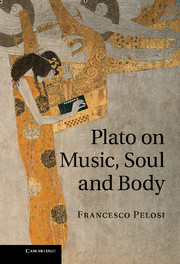3 - Musical education of rationality
Published online by Cambridge University Press: 05 November 2014
Summary
Proceeding with the analysis of the ways in which music intervenes on rationality, we encounter a part of Plato's reflection on music that is as famous as it is debated: the treatment of harmonic science in Resp. vii. The condition in which music, as a science of harmony, is admitted into the curriculum preparatory to dialectic is that it represents a discipline of conversion from sensible to intelligible. In the first part of the chapter we will see that this condition is satisfied if the mathēmata train certain psychic processes; and we will see that a study with an empirical stamp represents a risk in the case of the first four disciplines, in particular as regards harmonics' ‘kindred’ science, astronomy. In the second part, I will concentrate on Resp. 530d–531c, where Plato distances himself from both empirical and Pythagorean harmonic science. Here we will endeavour to define the ideal science of harmony and the analysis to which Plato subjects the intelligible and sensible content of music in this context.
HARMONICS BEYOND SOUND
A deep divergence separates the two great reflections on music in the Republic: on the one hand, that on mousikē in a basic paideia for the formation of sensibility, on the other, the reflection on harmonics in a programme of instruction for the future dialectians with the objective of shaping rationality.
- Type
- Chapter
- Information
- Plato on Music, Soul and Body , pp. 114 - 151Publisher: Cambridge University PressPrint publication year: 2010



